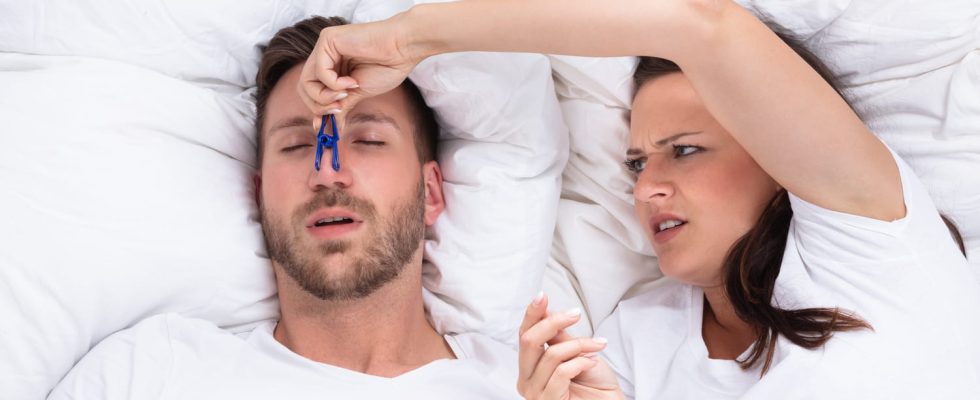Snoring can be the cause of many inconveniences for the snorer and the one who sleeps with it! Difficult sleep, fatigue on waking… Solutions to find noiseless nights with the advice of our doctor.
THE snoring can be the cause of many inconveniences for both the snorer and the person who sleeps with it: difficult sleep, fatigue… They are linked either to the soft palate vibrating and generates noise: “It’s like a sail flapping against the wind and its noises are continuous and regular” illustrates Dr. Didier Cugy, somnologist; either to one air flow that is no longer regular and who is turbulent. To better consider this phenomenon and find effective solutionswe queried the .
1. Exercise (to lose weight)
The soft palate can be infiltrated with fat and this overload will then interfere with breathing and cause snoring. You have to control your weight and resume regular physical activity if you need to lose weight. Overweight people are more at risk of snoring.
2. Avoid alcohol
The third measure is to avoid the consumption of alcohol. THE tensor palatine, a set of tensor muscles at the level of the soft palatewill be sensitive to the effects of this consumption and so vibrate and cause snoring. “People who have eaten or drank too much are likely to snore more.”
3. Sleep on your side
THE soft palate has an impact on snoring. Sleeping on your side can reduce this impact. For example if the innervation of the soft palate is poor, due to diseases related to dysautonomia (Parkinson, for example) or long Covid. Similarly, the control of the soft palate is also modulated by the depth of sleep. “The slower and deeper the sleep, the more the soft palate relaxes and snoring sets in.” There language also plays its role. The genioglossus which keeps the tongue forward and frees the respiratory tract can relax in the event of REM sleep and then promotes the occurrence of obstructions and respiratory dysfunction. Again, a side sleeping position counters this effect.
4. Correct your posture to stand up straight
Beyond the measures to facilitate the respiratory system, we can also take an interest in postural aspects: “This channel between the trachea and the pharynx is a bit like a pipe that can get clogged when you bend it. When you tend to be hunched over, head forwardwe promotes poor airflow and therefore snoring“ says Dr. Cugy. We will therefore turn to the postural correction by walking, muscle strengthening of the back and self-enlargements. “Training during the day will improve posture and overall muscle tone, and thus promote upper airway patency” he notes.
5. Work on your diaphragmatic breathing
Work on your diaphragmatic breathing through yoga or meditation for example is also a factor favoring theopening of the airways. “The sedentary lifestyle, the seated position mean that we have forgotten or lost diaphragmatic breathing for thoracic breathing who tends to close the airways and promote snoring and apnea.” THE nasal dilatorswhich can be found in pharmacies, will do the work that should be done naturally by good ventilation. “It can be interesting but it would be wiser to review your breathing” tempers the specialist. I’use of mint products or Algerian essence can also promote breathing but their effects only felt in the short term.
6. Operate the nasal septum?
The lungs, the organs of respiration, are connected to the outside world by the trachea and the pharynx, the space that goes from the nose to the trachea. “The particularity of this space is that it can clog more or less and from that moment, it will favor a turbulent airflow (like snoring, editor’s note)” notes the doctor. Obstructions which then hinder breathing can be at the level of the nose in relation to a deviated nasal septum. It is necessary to check that the nose does not pose a problem by observing if there is a deviation of the nasal septum and to see if it is not significant, by evaluating the possible consequences of traumatisms. In this case, advice should be sought from a ENT who will carry out the necessary examinations.
What are the causes of snoring?
“Snoring is not a simple symptom, it is a symptom that can take place at different levels of the upper respiratory system and which requires questioning and questioning these different elements”, notes Dr. Cugy.
► Obstructed breathing: Obstructions that interfere with breathing may be in the nose related to allergies, a deviation of the nasal septum or hypertrophy of the turbinates.
► erection products : the turbinates, structures in the nose, are used to heat the air. They are covered with erectile tissue which will react to the same stimulation as that of the sexual organs, which swell during periods of erection in both men and women, and therefore cause the nose to be blocked. “People who take products that promote erection will tend to snore” adds the doctor.
► A trauma : the consequences of trauma to the nose can facilitate snoring, especially in former athletes, boxers or rugby players: “When we have a child who blows red after trauma, you have to show it to the doctor and ENT.”
► The soft palate: The soft palate is very variable from one person to another: short or long veil, thick or thin veil. Depending on this anatomical conformation, the veil can obstruct the passage of air. When this space is blocked, we breathe through the mouth. This breathing is not natural, so the airflow is always turbulent and this causes or promotes snoring.
► Tongue size can also explain that the pharyngeal space is blocked. “When you examine the tongue, you can see if there are dental impressions and if so, you can understand why the airflow is hurting.”
Thanks to Dr Cugy, somnologist in Bordeaux.
